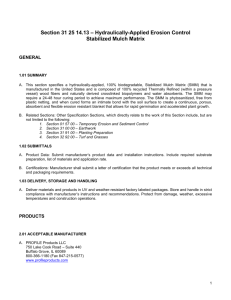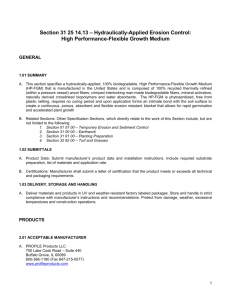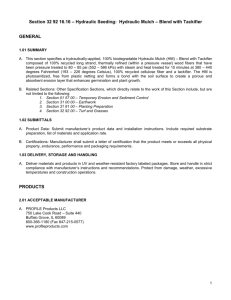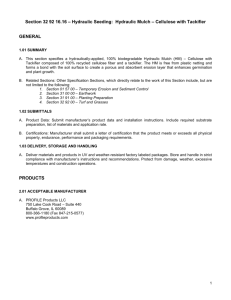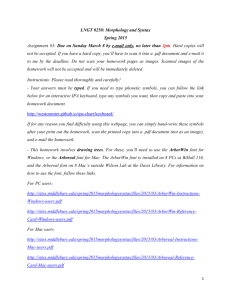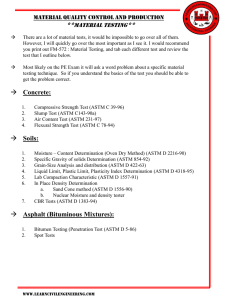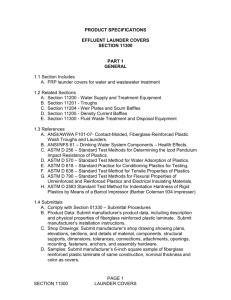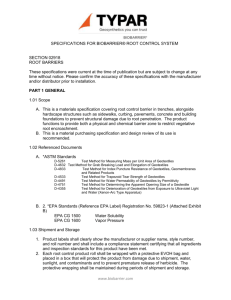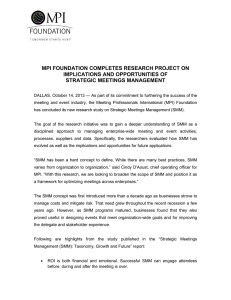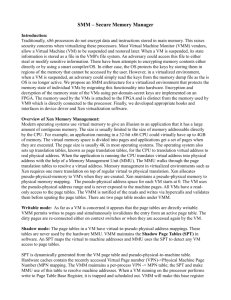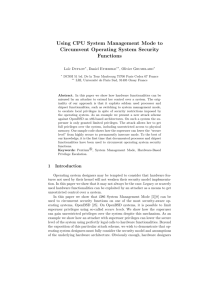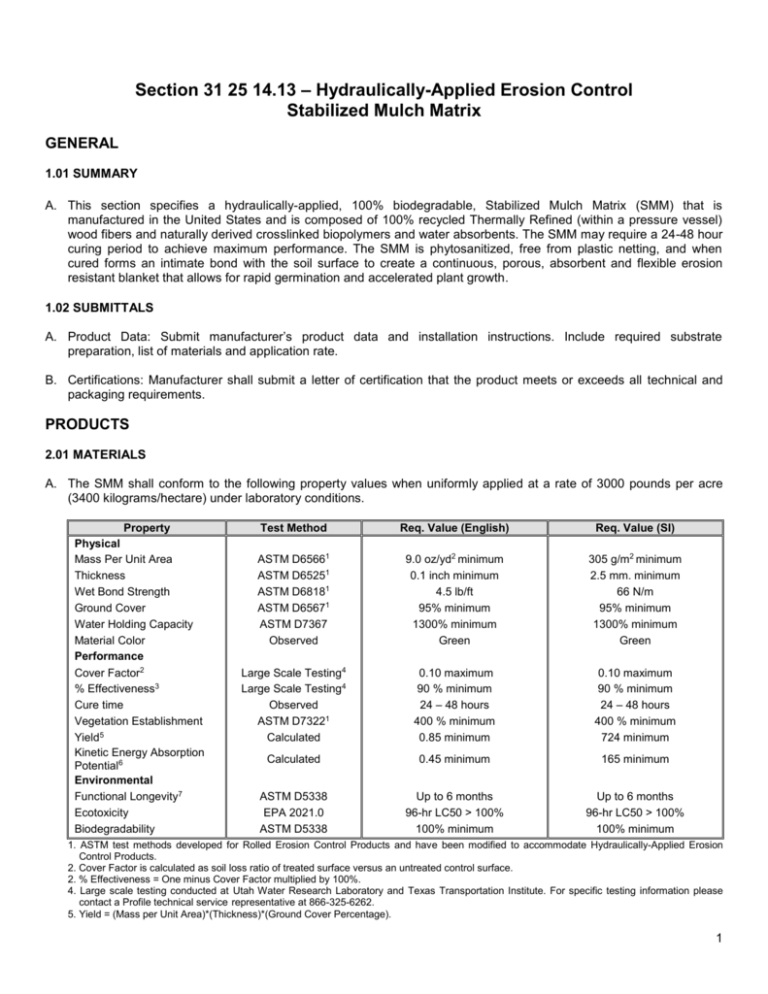
Section 31 25 14.13 – Hydraulically-Applied Erosion Control
Stabilized Mulch Matrix
GENERAL
1.01 SUMMARY
A. This section specifies a hydraulically-applied, 100% biodegradable, Stabilized Mulch Matrix (SMM) that is
manufactured in the United States and is composed of 100% recycled Thermally Refined (within a pressure vessel)
wood fibers and naturally derived crosslinked biopolymers and water absorbents. The SMM may require a 24-48 hour
curing period to achieve maximum performance. The SMM is phytosanitized, free from plastic netting, and when
cured forms an intimate bond with the soil surface to create a continuous, porous, absorbent and flexible erosion
resistant blanket that allows for rapid germination and accelerated plant growth.
1.02 SUBMITTALS
A. Product Data: Submit manufacturer’s product data and installation instructions. Include required substrate
preparation, list of materials and application rate.
B. Certifications: Manufacturer shall submit a letter of certification that the product meets or exceeds all technical and
packaging requirements.
PRODUCTS
2.01 MATERIALS
A. The SMM shall conform to the following property values when uniformly applied at a rate of 3000 pounds per acre
(3400 kilograms/hectare) under laboratory conditions.
Property
Physical
Mass Per Unit Area
Thickness
Wet Bond Strength
Ground Cover
Water Holding Capacity
Material Color
Performance
Cover Factor2
% Effectiveness3
Cure time
Vegetation Establishment
Yield5
Kinetic Energy Absorption
Potential6
Environmental
Functional Longevity7
Ecotoxicity
Biodegradability
Test Method
Req. Value (English)
Req. Value (SI)
ASTM D65661
ASTM D65251
ASTM D68181
ASTM D65671
ASTM D7367
Observed
9.0 oz/yd2 minimum
0.1 inch minimum
4.5 lb/ft
95% minimum
1300% minimum
Green
305 g/m2 minimum
2.5 mm. minimum
66 N/m
95% minimum
1300% minimum
Green
Large Scale Testing4
Large Scale Testing4
Observed
ASTM D73221
Calculated
0.10 maximum
90 % minimum
24 – 48 hours
400 % minimum
0.85 minimum
0.10 maximum
90 % minimum
24 – 48 hours
400 % minimum
724 minimum
Calculated
0.45 minimum
165 minimum
ASTM D5338
EPA 2021.0
ASTM D5338
Up to 6 months
96-hr LC50 > 100%
100% minimum
Up to 6 months
96-hr LC50 > 100%
100% minimum
1. ASTM test methods developed for Rolled Erosion Control Products and have been modified to accommodate Hydraulically-Applied Erosion
Control Products.
2. Cover Factor is calculated as soil loss ratio of treated surface versus an untreated control surface.
2. % Effectiveness = One minus Cover Factor multiplied by 100%.
4. Large scale testing conducted at Utah Water Research Laboratory and Texas Transportation Institute. For specific testing information please
contact a Profile technical service representative at 866-325-6262.
5. Yield = (Mass per Unit Area)*(Thickness)*(Ground Cover Percentage).
1
6. Kinetic Energy Absorption Potential = (Wet Bond Strength)*(Thickness)
7. Functional Longevity is the estimated time period, based upon ASTM D5338 testing and field observations, that a material can be anticipated to
provide erosion control and agronomic benefits as influenced by composition, as well as site-specific conditions, including; but not limited to –
temperature, moisture, light conditions, soils, biological activity, vegetative establishment and other environmental factors.
2.02 COMPOSITION
A. All components of the SMM shall be pre-packaged by the Manufacturer to assure both material performance and
compliance with the following values. No chemical additives with the exception of fertilizer, liming and biostimulant
materials should be added to this product.
1. Thermally Processed (within a pressure vessel) Wood Fiber – 95% + 3%
Heated to a temperature greater than 380 degrees Fahrenheit (193 degrees Celsius) for 5
minutes at a pressure greater than 50 psi (345 kPa)
Crosslinked Biopolymers and Water Absorbents – 5% + 1%
2.03 PACKAGING
A. Bags: Net Weight – 50 lb, UV and weather-resistant plastic film
Pallets: Weather-proof, stretch-wrapped with UV resistant pallet cover
Pallet Quantity: 40 bags/pallet or 1 ton/pallet
EXECUTION
3.01 SUBSTRATE AND SEEDBED PREPARATION
A. Examine substrates and conditions where materials will be applied. Apply product to geotechnically stable slopes that
have been designed and constructed to divert runoff away from the face of the slope. Do not proceed with installation
until satisfactory conditions are established.
B. Depending upon project sequencing and intended application, prepare seedbed in compliance with other
specifications under Section 1.01 B
3.02 INSTALLATION
A. Strictly comply with equipment manufacturer's installation instructions and recommendations. Use approved hydrospraying machines with fan-type nozzle (50-degree tip). To achieve optimum soil surface coverage, apply SMM from
opposing directions to soil surface. Rough surfaces (rocky terrain, cat tracks and ripped soils) may require higher
application rates to achieve 100% cover. Slope interruption devices or water diversion techniques are recommended
when slope lengths exceed 50 feet (15 m). Maximum slope length is for product applications on a 3H:1V slope. For
application on steeper slopes, slope interruption lengths may need to be decreased based on actual site conditions.
Not recommended for channels or areas with concentrated water flow. No chemical additives with the exception of
fertilizer, liming and biostimulant materials should be added to this product.
B. For Erosion Control and Revegetation: To ensure proper application rates, measure and stake area. For maximum
performance, apply SMM in a two-step process*:
1. Step One: Apply fertilizer with specified prescriptive agronomic formulations and 50% of seed with a small
amount of SMM for visual metering.
2. Step Two: Mix balance of seed and apply SMM at a rate of 50 lb per 125 gallons (23 kg/475 liters) of
water over freshly seeded surfaces. Confirm loading rates with equipment manufacturer. Do not leave
seeded surfaces unprotected, especially if precipitation is imminent.
*Depending upon site conditions SMM may be applied in a one-step process where all components may be mixed
together in single tank loads. Consult with Manufacturer for further details.
Best results and more rapid curing are achieved at temperatures exceeding 60°F (15°C). Curing times may be
accelerated in high temperature, low humidity conditions with product applied on dry soils.
Over-application of product may inhibit germination and plant growth.
2
C. Mixing: A mechanically agitated hydraulic-application machine is strongly recommended:
1. Fill 1/3 of mechanically agitated hydroseeder with water. Turn pump on for 15 seconds and purge and
pre-wet lines. Turn pump off.
2. Turn agitator on and load low density materials first (i.e. seed).
3. Continue slowly filling tank with water while loading fiber matrix into tank.
4. Consult application and loading charts to determine number of bags to be added for desired area and
application rate. Mix at a rate of 50 lb of SMM per 125 gallons (23 kg/475 liters). Contact Equipment
manufacturer to confirm optimum mixing rates.
5. All SMM should be completely loaded before water level reaches 75% of the top of tank.
6. Top off with water and mix until all fiber is fully broken apart and hydrated (minimum of 10 minutes —
increase mixing time when applying in cold conditions). This is very important to fully activate the bonding
additives and to obtain proper viscosity.
7. Add fertilizer
8. Shut off recirculation valve to minimize potential for air entrainment within the slurry.
9. Slow down agitator and start applying with a 50-degree fan tip nozzle.
10. Spray in opposing directions for maximum soil coverage.
D. Application Rates: These application rates are for standard conditions. Designers may wish to reduce rates to
encourage faster vegetation establishment or may need to increase application rates on rough surfaces.
Slope Gradient / Condition
English
SI
< 4H to 1V
> 4H to 1V and < 3H to 1V
> 3H to 1V and < 2H to 1V
> 2H to 1V and < 1H to 1V
> 1H to 1V
Below ECB or TRM
2500 lb/ac
3000 lb/ac
3500 lb/ac
4000 lb/ac
4500 lb/ac
1500 lb/ac
2800 kg/ha
3400 kg/ha
3900 kg/ha
4500 kg/ha
5100 kg/ha
1700 kg/ha
3.03 CLEANING AND PROTECTION
A. After application, thoroughly flush the tank, pumps and hoses to remove all material. Wash all material from the
exterior of the machine and remove any slurry spills. Once dry, material will be more difficult to remove.
B. Clean spills promptly. Advise owner of methods for protection of treated areas. Do not allow treated areas to be
trafficked or subjected to grazing.
D ENGLISH SI
© 2011 PROFILE Products LLC. All Rights Reserved. A copyright license to reproduce this specification is hereby granted to non-manufacturing
landscape architects, specification writers and designers.
Revision Date: 04/2011
3

